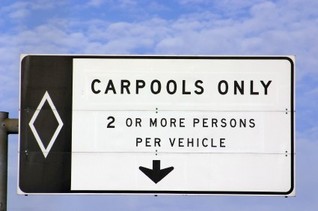
New rideshare services match commuters using Facebook, text messaging, GPS, and iPhone 3G. What's next? Devices that provide not only real-time information (about traffic and approaching buses, for example), but also anticipate a commuter's travel patterns and suggest personalized transportation alternatives. That's the vision, at least, of transit scholars from the Center for Urban Transportation Research, or CUTR, at the University of South Florida.
If it sounds far off, consider the growing number of startups now racing to capitalize on rising fuel costs, increased congestion, shrinking budgets, and advances in technology that could make ridesharing more convenient. Oh, and profitable too -- though in Silicon Valley style, that comes after cultivation of a massive user base.
"Over 100 other sites are trying to do this in some form," said John Zimmer, co-founder of Zimride,
which recently launched a Facebook application connecting drivers and
passengers within existing communities. "But no one has solved it to
the point of creating a reliable form of transportation."
The latest entry in the tech-enabled rideshare world, Avego, comes from Ireland-based Mapflow. It uses the new iPhone's GPS
feature to link potential carpoolers based on their destinations and
real-time locations -- providing what transportation wonks call dynamic
ride-matching.
Here's how it works: Users register with their name, credit card
information, and a photograph (think of it as creating a license to carpool on your phone). They can also choose to filter the
network, limiting results to say, women or co-workers. Passengers receive
text messages about drivers before they arrive, and opt to accept or reject a pickup. After meeting a driver face to
face and deciding to take the lift, they key in a code to authorize a $0.30-per-mile charge via PayPal.
Avego takes 15 percent, and drivers get the rest, again through PayPal.
The service debuted at this week's DEMO conference and Mapflow plans to launch a beta version by the end of October.
Zimride also expects to launch a mobile, location-aware application
this fall in partnership with a company called Ecorio. This one tracks
carbon emissions associated with each trip and lists alternatives to
driving solo. Score one for the scholars.
Of course, carpooling isn't for everyone, says Phil Winters, director of the Best Workplaces for Commuters and Transportation Demand Management programs at CUTR. But neither is it
an all-or-nothing proposition. Winters has studied (PDF download) how tracking
commuters' travel patterns with GPS, sharing the data with them, and
offering ways to spend less time in single-occupancy vehicles affects
behavior. "A lot of people say, 'I can't do it because on Thursdays I
have classes,' and they're apologetic because sometimes they can't do
it." But present them with practical alternatives, and they tend to
rethink transit choices.
By all accounts, building that all-important user base
is far from simple. "It is in a sense a cultural shift," said Zimmer -- something he said has happened before. "Zipcar was very successful in shifting how people
think about transportation." The leading U.S. car-sharing company,
Zipcar has 225,000 members and signed up 11,000 newbies in July alone. Still, it leans heavily on venture capital and has yet to turn a profit
after nearly a decade in the business. Zimride, Avego, and their ilk
take the Zipcar promise -- an affordable, green, convenient alternative
to typical transportation choices -- and eliminate the overhead of
maintaining a fleet of vehicles and covering considerable fuel costs.
Think it can work? Maybe, said CUTR researcher Sean Barbeau. But
once users find trusted travel companions who will chip in for gas, a
broker like Avego becomes an unnecessary expense. Bad news for
the company, he said, but not a total loss: "The end result from a transit point
of view is that's a good thing."
Share your tips: What's your secret to successful ridesharing?

